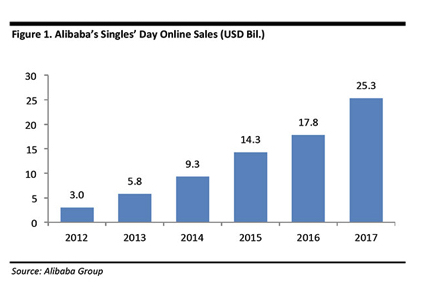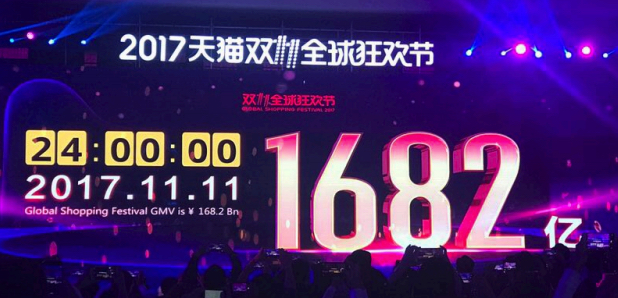Singles’ Day, November 11, is the biggest online shopping day in the world. The holiday was originally created in the 1990s by Chinese college students who wanted to celebrate their single status. In 2009, Alibaba used the idea to market its first Singles’ Day shopping event, offering special “double 11” deals to single people who wanted to treat themselves by buying things they desired. The event is now officially known as the 11.11 Global Shopping Festival, and Alibaba shattered sales records once again during this year’s festival.
Alibaba’s total gross merchandise volume (GMV) on Singles’ Day reached $25.3 billion (¥168.2 billion), up 39% year over year in renminbi terms. The company’s payment system, Alipay, processed 1.48 billion transactions in the 24-hour period. To put these figures in perspective, online sales on Black Friday last year totaled $3.0 billion, and Cyber Monday sales totaled $3.45 billion, according to Adobe estimates.

We think three specific factors contributed to Alibaba’s record-high sales on Singles’ Day this year:
- Alibaba incorporated significant offline retail offerings into the event.
- A larger number of brands participated this year, making the event more appealing to Chinese consumers.
- Alibaba extended the shopping festival from a one-day event into a seasonal promotion.
- Alibaba Drove Sales by Integrating Significant Offline Retail Offerings
The 11.11 Global Shopping Festival’s record sales results in 2017 represent a major success for Alibaba’s New Retail strategy, which refers to the integration of online and offline retail, logistics, and data across a single value chain. Through the strategy, Alibaba seeks to bring digitalization to the offline retail world, which currently generates 82% of total retail sales in China. Alibaba offered a more integrated online/offline experience this year, along with additional offline components, and it leveraged brands’ offline locations to drive sales.
The offline components enriched the overall experience for customers and improved engagement throughout their shopping journeys. Alibaba partnered with 1,000 brands, including L’Oréal, Mondelēz, Nestlé and Procter & Gamble, to set up 100,000 smart stores in 31 cities in China. Shoppers at these stores could browse merchandise and then purchase items via Alibaba’s e-commerce platforms by scanning QR codes on the items in the stores. In addition, Alibaba’s technology enabled some 600,000 mom-and-pop convenience stores and 30,000 rural retail centers to participate in the shopping festival for the first time this year.
- Increased Brand Participation Made Singles’ Day More Appealing to Chinese Consumers
The number of brands participating in Singles’ Day increased greatly this year, as did the number of new products offered. This broadened the appeal of the shopping festival to more Chinese consumers who were looking to discover new products, and it drove more traffic and sales. More than 140,000 brands and merchants participated in the 11.11 Global Shopping Festival in 2017, a significant increase from last year’s 100,000. That total included more than 60,000 international brands, up from 11,000 last year.
Many merchants that had participated in the festival in previous years expanded their product offerings this year. For example, the Macy’s Tmall Global flagship store offered 4,000 SKUs this year, five times more than last year. Other brands used the occasion to launch new products. Apple, for instance, launched the iPhone X in China on the Tmall site.
- Alibaba Extended the Shopping Festival from a One-Day Event into a Seasonal Promotion
Similar to Black Friday, the 11.11 Global Shopping Festival now extends well beyond a one-day event; this year, the promotion stretched over three weeks. Alibaba’s “See Now, Buy Now” fashion show on October 31 kicked off the shopping season, and many retailers began offering presale deals days before November 11, encouraging shoppers to browse deals and load up their carts in anticipation of their Singles’ Day shopping spree.
Summary
Singles’ Day has evolved into the biggest online shopping event in the world, with Alibaba’s sales hitting a record $25.3 billion in 24 hours this year, up 39% from last year. The company’s New Retail initiatives contributed to the event’s success. This year, Alibaba incorporated significant offline retail offerings into the festival and added more than 600,000 local convenience stores and 30,000 rural stores to its platform. In addition, an unprecedented number of brands participated in the festival this year and the company extended the event from a one-day sale into a three-week shopping season. All of these efforts helped Alibaba generate record-shattering Singles’ Day sales yet again this year.
Other pieces you may find interesting include: Singles’ Day 2017 Wrap-Up: New Retail Helps Boost Singles’ Day Sales to Record High, Singles’ Day to Continue to Expand, Even as Shoppers Shift Focus From Discounts to Product Quality, Says New FGRT Report
Connect with us on social media:
@DebWeinswig
@FungRetailTech
Facebook
LinkedIn
Subscribe to our YouTube channel
Pinterest
Instagram
